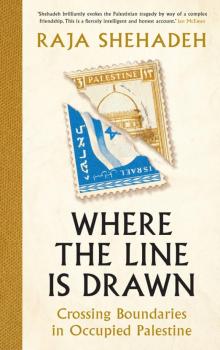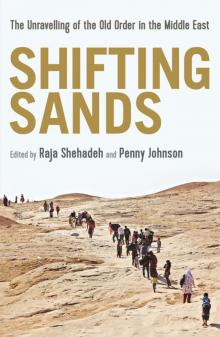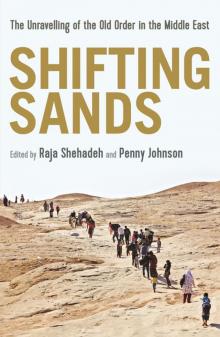- Home
- Raja Shehadeh
Shifting Sands: The Unravelling of the Old Order in the Middle East Page 2
Shifting Sands: The Unravelling of the Old Order in the Middle East Read online
Page 2
Hope may seem a scant commodity in today’s crisis-ridden landscape. Indeed, for three of our contributors discussing living and writing in the Middle East, and in particular the writing of fiction, hope is located in the imagination. Kuwaiti writer and scholar Mai al-Nakib notes that fiction can draw ‘attention away from a dominant order that often seems to choke off any sense of possibility’. Reclaiming the cosmopolitanism of Kuwait’s past through the fictional imagination counters a ‘state of amnesia’ where, for example, the 380,000 Palestinians who lived in Kuwait until 1991 have been erased in the present normative version of the past. Marilyn Booth finds that ‘fiction’s histories’, whether in the contemporary writing of al-Nakib and Selma Dabbagh, or the novels of Arab women writers of a hundred years ago, offer a ‘critical, alternative history of communities’, as well as reminding us of the persistence of issues of social equality and youthful aspirations. Dabbagh embraced the challenges of a diaspora writer imagining a ‘fictional Gaza’ and in so doing not only brought Gaza into her readers’ imaginations, but healed a rift in Palestinian lives.
In her essay, Selma Dabbagh also discusses some of the obstacles faced by writers in Arabic – from lack of translation and resources to censorship in their home countries – and adds a personal note as a British-Palestinian novelist writing in English. To her observation that book buyers often classify literature from the Middle East as necessarily dark and gloomy and thus unmarketable, we might add a note, from trawling the blogosphere or indeed reviewing almost any newspaper comments page or articles about Palestine and Israel or Islam, that the issues are not only already known, but occasion instant and often vitriolic and industrially produced responses. There is thus a need for other spaces and forms of engagements – offered, we hope, by this and many other books on the Middle East that do not provide instant answers but engage readers in exploring the questions.
The writers in Shifting Sands are not aiming to inform readers about the very latest events – which will be superseded in any case by the time of publication – but to provide ways to understand these events. Nor do the writers aim to produce a uniform analysis – some may indeed disagree – but rather to explore the major themes and issues in the unravelling of a century-old order in the Middle East. The passionate civility of audiences at the Edinburgh International Book Festival and their probing questions contributed to this book and we thank the Festival for providing the opportunity for this engagement, away from the overheated world of information that can impede a deeper understanding.
In the afterword, Raja Shehadeh, through an exploration of conversations in a shared taxi ride from Ramallah to Jerusalem, illuminates the dilemmas of the present dark times. He argues, however, that a solution to the Palestine/Israel problem, based on equality and an end to exclusion, can offer a new vision for the Middle East based on cooperation and cosmopolitanism.
This vision may seem distant amid the present conflagrations. Our summer of fire in 2014 ushered in a violent autumn and winter in the Middle East. The Gaza War was (perhaps) over, but the plight of Gazans remained unaddressed, while the wars in Syria and Iraq escalated with terrible consequences for civilians. However, we also marked another anniversary, the twenty-fifth anniversary of the fall of the Berlin Wall on 9 November 2014. Like the Arab Spring and other utopian moments, the euphoria at this signal event did not lead to a more peaceful and equal global order. Instead, we are plagued by rampant social inequality, unregulated economic growth with its disastrous environmental consequences, and what the poet Robert Lowell called ‘small war after small war until the end of time’. The world may no longer embrace MAD (Mutual Assured Destruction), but it is increasingly dangerous.
With the perilous situation in much of the Middle East today, we cannot afford false optimism, and the writers in Shifting Sands do not shy away from hard, sometimes painful, analysis. But we also cannot afford to ignore what Alev Scott calls ‘civic courage’, that intangible but vital resource. On the anniversary of the fall of the Berlin Wall, young Palestinian activists in the West Bank gathered and, using hammers and their hands, smashed a hole in what Palestinians call the ‘Apartheid Wall’. And in the village of Battir in the southern West Bank – now a UNESCO World Heritage site because of its ancient terraced hills – children flew white balloons over the railway station where trains no longer stop on their way to the coast, across the Wall they are forbidden to traverse, with messages against occupation and for peace. ‘From Battir to Berlin’ was the village’s message. Balloons and hammers: other versions of the screwdriver against bombs that generate a fragile hope.
LINES IN THE SAND
The Great War and the Remaking of the Middle East
THE POST-OTTOMAN SYNDROME
Avi Shlaim
MUCH OF THE MIDDLE EAST has been living with a chronic condition for almost a century which I term the post-Ottoman syndrome. Its symptoms are turmoil, instability and a deficit of rights for the peoples of the region. A major cause is the lack of legitimacy of the new political and territorial order that emerged in the wake of the First World War and the collapse of the Ottoman Empire. That state system, in the lands formerly controlled by the Ottomans, was largely the creation of colonial powers and designed to serve their interests.
In the course of the First World War, the Entente powers, Britain and France, made various secret plans for dividing the lands of the Ottoman Empire in the event of victory. Behind France’s back, Britain promised a share of the spoils to its Arab allies to induce them to take up arms against their Ottoman overlords. Towards the end of the war Britain made public promises to support the Zionist project in Palestine which were incompatible with its earlier undertakings. To make sense of the tangled and tortuous diplomacy behind these contradictory promises, it is therefore necessary to examine not only the relations between the two colonial powers but also their relations with their respective local allies.
Wartime diplomacy was further complicated by mutual mistrust between the two colonial powers. The French called Britain ‘perfidious Albion’, based on its long record of deviousness and double-dealing. Britain did indeed act in a selfish manner, but there was nothing unusual in that: selfishness is in the DNA of colonial powers. France too was not exactly a paragon of virtue. My aim here is not to dwell on wartime diplomacy, fascinating as it is, but to spell out its consequences for the post-war regional order. My main emphasis will be on the borders set by the colonial powers and on the successor states they created after the fall of the Ottoman Empire. To be sure, wartime partition plans were rather like drawing ‘lines in the sand’. The bargaining power of each of the participants kept changing in line with its fluctuating fortunes on the battlefield. But the international borders that the victors set after the war have lasted down to the present day, with the exception of Israel–Palestine. They have proved to be remarkably stable, almost sacrosanct – perhaps the only stable element in a volatile region. The way in which these borders emerged is therefore not merely of historical interest; it is a crucial element in the remaking of the modern Middle East.
In the course of searching for allies against the Ottoman Turks, the British made a number of promises, some of them secret and some open. The three most important promises were to the Arabs, the French and the Jews. First, in an effort to foster an anti-Turkish rebellion in the Arab lands, Britain entered into secret negotiations with Hussein, the Sharif of Mecca, whose descendants later became the kings of Jordan. The Hashemites claimed direct descent from the Prophet Muhammad and were hereditary guardians of the Holy Places in Mecca and Medina in their ancestral home in the Hijaz in Western Arabia, but they were also nominal vassals of the Ottoman Sultan. Conspiring with infidels against a Muslim overlord was quite a risky undertaking for the conservative Sharif, hence the need for secrecy. Between July 1915 and March 1916 ten letters were exchanged between the Sharif and Sir Henry McMahon, the British high commissioner in Egypt. In these letters Britain promised the Sharif to recognise and sup
port an independent Arab kingdom under his leadership after the war in return for taking up arms against the Ottomans. The British promise was vaguely worded, imprecise about borders and failed to make clear whether Palestine was to be included in the Arab kingdom.
Vague as they were, Britain’s assurances led to the outbreak of the Arab Revolt against the Turks in June 1916. As its origins make all too clear, the Arab Revolt, which is remembered to this day as the golden age of Arab nationalism, was in essence an Anglo-Hashemite plot, an unholy alliance against the Ottoman Sublime Porte. Britain financed the Arab Revolt as well as supplying arms, provisions, artillery support and experts in desert warfare, among whom was the legendary T. E. Lawrence, better known as ‘Lawrence of Arabia’. The Hashemites promised much more than they were able to deliver, and the military value of the revolt was modest; indeed, Lawrence’s account greatly exaggerated its military successes.1
Second, Britain reached a secret understanding with France in May 1916, the Sykes–Picot Agreement, discussed by James Barr in this volume and covered in fascinating detail in his book A Line in the Sand (2011). The two officials drafted a plan to divide the land between the Mediterranean and the Persian Gulf into two ‘spheres of influence’ in the event of victory. No agreement could be reached on Palestine, so the compromise solution was to place it under an international regime.
Future historians would cite the Sykes–Picot Agreement as a prime example of imperial perfidy. Palestinian historian George Antonius denounced it as ‘a shocking document’ and ‘a startling piece of doubledealing’.2 The perfidy is undeniable, but its consequences have often been exaggerated. It is a common misconception – shared by, among others, the Islamic State today – to think that the Sykes–Picot Agreement fixed the borders of the modern Middle East. In fact, it bears little resemblance to the borders that were settled by the League of Nations at the conference of San Remo in 1920. Instead, Sykes–Picot is significant as the beginning of the process of colonial division of the region.
The third and most famous British undertaking, again vaguely worded and imprecise but this time not secret, was the promise contained in the Balfour Declaration of 2 November 1917 to support the establishment of a national home for the Jewish people in Palestine. At that time the Jews made up barely 10 per cent of the population of Palestine. Supporting their national rights in Palestine meant denying them to the Arab majority. Balfour’s declaration was thus a classic colonial document. The main motive behind it was less to support the fledgling Zionist movement than to harness the perceived influence of world Jewry to the British war effort. The prime mover behind the declaration was David Lloyd George, who became prime minister in December 1916. His support for Zionism was based on a huge overestimate of Jewish influence. In aligning Britain with the Zionist movement, he acted in the mistaken – and anti-Semitic – view that the Jews turned the wheels of history. In fact, the Jewish people had little influence other than the myth of clandestine power. Issuing the Balfour Declaration turned out to be one of the most colossal blunders in British imperial history. It brought Britain much ill will in the Arab world and no corresponding benefits, not even the gratitude of its Jewish protégés.
British policymakers had no clear idea as to how they would reconcile the promises they made to the Arabs, the French and the Zionists. Consequently, there was confusion as well as duplicity in Britain’s policy towards its wartime allies. Furthermore, as the war progressed, the British policymakers became more acquisitive. Lenin said that imperialism causes war. In Britain’s case, it was the war that fuelled imperialism. Lloyd George wanted to grab more and more Ottoman territory, regardless of the agreements entered into by his predecessors. His aim was to establish British hegemony in the Middle East, to gain access to its oil fields and to bring Palestine into the British sphere of influence.
Lloyd George’s imperial ambitions in the Middle East went against the current of American anti-colonialism, which was running high with Woodrow Wilson as president. The President’s high-minded attitude to politics, enunciated in his Fourteen Points, denounced secret diplomacy and upheld the right of small nations to self-determination. America entered the war in April 1917, a month after the Bolshevik revolution put Russia hors de combat, and there was a short period of intense involvement in the affairs of the Middle East before lapsing once again into isolation. Woodrow Wilson knew that the European powers had entered into secret agreements to aggrandise their empires and he did not want his country to be associated with a war that served imperial interests. He wanted a war to end all wars by basing the post-war order on the right to national self-determination. Naturally, some Middle Easterners associated Wilson’s Fourteen Points with their own aspiration to achieve freedom from European domination and welcomed the arrival of the anti-imperialist power as a participant in Middle East politics.
Feeling on the defensive, Britain and France issued a joint declaration on 7 November 1918, a few days before the Armistice, in which they clearly recognised the Arab right to self-determination. The declaration opened with a statement of breathtaking insincerity:
The end which France and Great Britain have in view in their prosecution in the East of the war let loose by German ambition is the complete and definitive liberation of the peoples so long oppressed by the Turks and the establishment of national Governments and Administrations drawing their authority from the initiative and free choice of indigenous populations.
It ended on a self-righteous note, denying any wish to impose their own system, promising to respect the will of the people and to secure impartial and equal justice for all.
One searches in vain for any trace of these lofty ideals in the conduct of the European statesmen at the peace conference that convened in Paris in January 1919. It was not the rights of small nations but the rivalries and clashes of the big powers that dominated proceedings. Lloyd George wanted to bring America into the Middle East as Britain’s ally and even suggested that America should have responsibility for Constantinople and Armenia, which had originally been assigned to tsarist Russia. Wilson, however, resisted all of the arrangements proposed by the European powers, suggesting instead an investigating commission to ascertain the desires of the people in the area. The clash between Lloyd George’s old-fashioned imperialism and Woodrow Wilson’s ineffectual idealism ensured that the peace negotiations went from bad to worse.
The Arabs were represented at the peace conference by Emir Faisal, Sharif Hussein’s son, who had formed a temporary administration in Syria but was out of his depth in the world of European diplomacy and eventually left Paris empty-handed. Faisal and his nationalist followers pinned their hopes on American help in their struggle for independence. These hopes were strongly articulated in the resolutions of the General Syrian Congress, which assembled in Damascus on 2 July 1919. ‘We rely,’ said the delegates, ‘on President Wilson’s declaration that his object in entering the War was to put an end to acquisitive designs for imperialistic purposes.’ They demanded the repudiation of the Sykes–Picot Agreement and the Balfour Declaration; the recognition of Syria, including Palestine, as a sovereign state with Emir Faisal as king; and the granting of independence to Iraq. In conclusion, the delegates affirmed their belief that the settlement should reflect the real wishes of the people and looked to ‘President Wilson and the liberal American nation, who are known for their sincere and generous sympathy with the aspirations of weak nations, for help in the fulfilment of our hopes’.
President Wilson did try to help by sending to Palestine and Syria a commission of inquiry to find out the wishes of the inhabitants. But the King–Crane Commission was a purely American affair, since France and Britain declined to participate in this exercise. The commissioners reported general opposition to Zionism and to the imposition of a French mandate. They also made recommendations for Syria, Palestine and Iraq that were designed to lead to independence at the earliest possible date. But the work of the commission was an exercise in futility. What
Woodrow Wilson failed to understand was that consultation is a purely academic exercise − academic in the sense of futile − unless the consulting body has the authority and the will to act on what it learns.
By the end of 1919 Woodrow Wilson had had enough of what he described as ‘the whole disgusting scramble’ and sailed back to the United States, turning over his Arab admirers to the tender mercies of the colonial powers. When the high-sounding Supreme Council of the Peace Conference met in San Remo in April 1920, it brushed aside all Arab claims and the wishes of the inhabitants and reached a settlement that satisfied only the victors. It was fundamentally a victors’ peace. Britain received a League of Nations mandate for Iraq and Palestine which included Transjordan. France received a mandate for Syria and the Lebanon. Mandates were imperialism by other means.
In Arab eyes the San Remo decisions were nothing but a betrayal and a profound humiliation. They sealed the fate of the United Kingdom of Syria, which had been proclaimed by the Greater Syrian Congress on 7 March 1920, with Faisal on the throne. In July 1920 French forces marched on Damascus, banished Faisal into exile and took over the government of the country. Thus was created the modern state of Syria, under French control and on the ruins of the dream of a united and independent Arab kingdom led by the Hashemites.
The French were no friends of Arab nationalism, viewing the Arab Revolt as Britain in Arab headgear. France’s traditional friends were the different Christian sects, and especially the Maronites, who formed the large majority of the population in Mount Lebanon, and on 31 August 1920 the French created yet another state with new borders, issuing a decree establishing the state of Greater Lebanon.

 Going Home
Going Home Where the Line is Drawn
Where the Line is Drawn Shifting Sands
Shifting Sands Palestinian Walks
Palestinian Walks Shifting Sands: The Unravelling of the Old Order in the Middle East
Shifting Sands: The Unravelling of the Old Order in the Middle East